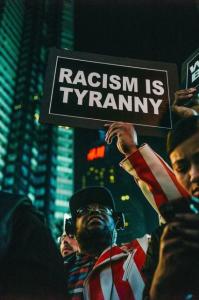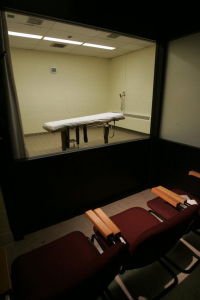Podcast: Play in new window | Download
Updates:
Michael Ratner: Is Congress’ Decision On Obama’s Plan To Close GTMO Really A Setback As Newspapers Report?
- Congress was considering whether to allow Guantanamo detainees to be resettled in the United States.
- That’s something Obama wants to do because so far he’s been unwilling to settle them in other countries.
- That bill failed and so when we get the NDAA or whatever legislation it will be put in, it will have transfer restrictions of a sort but it will not permit detainees to be transferred to the United States.
- Obama has had 6 years to make good on his promise that he would close Guantanamo in a year.
- Guantanamo remains, more than 142 people. More than half 73, have been cleared for release.
- On January 11, 2015, I urge all of us to get in the streets demonstrate and tell Obama to shut it down.
——-
Michael Ratner: The Right Livelihood Awards In Stockholm, Sweden
- I just came back from Stockholm, Sweden where the Right Livelihood Awards, also known as the alternate Nobel Prize are given out annually.
- Amy Goodman has received such an award. This time there were five awardees.
- One of whom is Edward Snowden. That was one of the reasons I was there because who are involved in defending protecting whistleblowers were in Stockholm for that award.
- The awards are not given by the Swedish government. Sweden is not a progressive government. It’s tied with Israel as the 3rd biggest arms dealer in the world.
- Sweden did recognize that Palestine should be a state.
United Nations Committee May Question U.S. Officials On Handling Of Michael Brown Shooting
——-
Ferguson: It is Right to Resist, By Any and All Means Necessary
Two weeks after the non-indictment of former officer Darren Wilson over the killing of Michael Brown, protests continue nationwide from classrooms to places of work. Will a genuine movement gain traction in the wake of outrage and defiance to the grand jury decision? A movement coalescing against police violence will need to confront police, and resist the legitimacy of the state writes Glen Ford founder of the Black Agenda Report. He says the people of Ferguson’s mass violations of the curfews and countless decrees of the militarized city, county and state police were, by definition, illegal acts – which is what made the small town a model of resistance.
- Not to belittle all the work people have put into this. There’s been a pent up energy that has been building and I mean for literally decades. We have to compare this explosion as you call it of activism to the period of quietude for decades even as the contradictions that led to Michael Brown’s murder and a multitude of murders kept on becoming more acute.
- We have to understand that there were forces that were keeping a lid on the explosion, and finally those forces could no longer do so and we see the explosion in 170 or more cities.
- Black folks have never trusted the police and never had any reason to trust the police. It’s never been about trust its been about power. The power of a community to protect its youth, its sons and daughters from being gunned down on the streets by these police or sucked up into the mass black incarceration machinery.
- The helplessness has not been something inherent to black folks its because we’ve had a kind of fifth column in our midst that we at Black Agenda Report call the black misleadership class which has engaged in very enthusiastic collaboration with the same people who created this black mass incarceration state.
- Back in June there was a vote in the house and the senate on a bill that would’ve prevented the Pentagon from transferring its weaponry and all of its militarized gear to local and state police departments.
- Four out of five Congressional Black Caucus members either voted against that bill or abstained. 32 out of the 40 members, so 80 percent of the Congressional Black Caucus. I guess its fitting that they stand in for this black misleadership class. They were financing the murder of people like Michael Brown.
- So, this is our problem, that these are the people that keep the lid on.
- What should be an ongoing, not simmering distrust, but an ongoing explosion of resistance.
- All of this started in terms of legislative form with the Law Enforcement Assistance Administration that was part of an omnibus crime bill that was passed in 1968 signed by Lyndon B Johnson which began by transferring massive federal resources to local police departments.
- It’s been gradual, steady and now institutionalized.
- This is the movement that does not yet have a name and it doesn’t have a name because its not yet clear about its objectives.
- The response to this civil rights and black power movement was the mass black incarceration state.
- Community control of the police and its a very very difficult subject. It was the subject that the Black Panther Party was born to tackle.
- The community should be empowered to fire police, just like communities are being empowered through their mayor to fire teachers.
- This movement can’t treat police as legitimate, that is coercive mechanisms of the state.
- Their police, their security apparatus, their intelligence apparatus has to be seen and opposed as illegitimate.
- He’s always in a huddle with President Obama (Al Sharpton) and that’s why I call him “king rat.”
- The real ratting that he does is that he goes across the country and he makes an assessment of who is in opposition to the administration’s policy or mass incarceration order and then goes right back to the commander and chief of the regime and tells him who might be creating trouble and how those troublemakers can be neutralized. That’s the real rat.
- Mass arrests and provocateurs and such. This is what Sharpton’s really talking about when he talks about the full weight of the president’s office.
Guest – Glen Ford, founder of the Black Agenda Report and many other media forums. Ford was a founding member of the Washington chapter of the National Association of Black Journalists (NABJ); executive board member of the National Alliance of Third World Journalists (NATWJ); media specialist for the National Minority Purchasing Council; and has spoken at scores of colleges and universities.
——-
Ohio Republicans Push Law to Keep All Details of Executions Secret
Republican lawmakers in Ohio are rushing through one of the most extreme secrecy bills yet attempted by a death penalty state. It’s called HB 663 and it withhold information on every aspect of the execution process from the public, media and even the courts. Ohio has experienced four botched executions in eight years. The most recent was the 26 minute death of Dennis McGuire in January 2014. An experimental two-drug combination was used and it was reported that Dennis was gasping and fight for breath. Another aspect of HB 663 is that seeks to undermine strict distribution controls that have been placed on foreign companies that manufacture pentobarbital.
- They’re really trying to ram through the last few weeks of our lame duck session.
- I think they want to resume executions here in the state of Ohio in 2015.
- We’ve had a moratorium on executions since the beginning of 2014 when we had a botched execution of Dennis McGuire and the federal court has been trying to come with new protocol, new drugs that won’t lead to a botched execution.
- I think the legislators want to move forward with the next scheduled execution in February so they’re trying to push it through as quickly as possible.
- I think they’re interested in secrecy because of all the controversy that has plagued Ohio executions over the last decades.
- I think this a natural concern from the government – when something is not going well, they want to hide it from the public.
- Unfortunately that never really works out well for the government because when you operate in secret, the only things that follow are corruption, abuse, negligence and incompetence.
- The legislation would shield anyone who really touches the lethal injection process from public records laws.
- For those medical professionals who advise or assist on the executions, it would prevent the state licensing board from holding them accountable for violating their oath.
- Unfortunately bad ideas often travel quickly. We have five states with secrecy legislation of some sort in place, we have 15 states that tried to enact secrecy legislation.
- Compounding pharmacies are smaller companies, often one or two pharmacists. They make small batches of drugs made to order. They’re not regulated in any meaningful way by the FDA.
- When they make these drugs in small batches, one batch could be more effective or less effective than another batch. When you’re talking about a lethal injection where you need to insure a humane and constitutional way, if you have a drug that’s being used in the lethal injection process that’s not effective, you have a very high chance of that person going through an execution that will violate our constitution.
- We have to accept that the death penalty does exist in states like Ohio and if we are to have the death penalty then we need to make sure that it complies with our laws and that those who are subjected to the death penalty are not treated inhumanely and in a way that will violate our constitution.
- I think we can do that while moving toward abolishing the death penalty.
Guest – Attorney Mike Brickner, senior policy director of the American Civil Liberties Union (ACLU) in Ohio. Brickner recently opposed the new bill in front of a committee at the Ohio State legislature. In 2013, Mike co-authored two reports focusing on the intersection of poverty and the criminal justice system. The Outskirts of Hope: How Debtors’ Prisons are Ruining Lives and Costing Communities chronicled how courts were illegally imprisoning low-income Ohioans because they could not afford to pay their fines. The report culminated in the Ohio Supreme Court increasing education and training for court personnel and issuing bench cards with clear rules for collecting fines and court costs. He also co-authored and designed the ACLU’s April 2011 report, Prisons for Profit: A Look at Private Prisons. The report highlights the problems faced by other states who have privatized prisons, including: increased costs, safety problems, a lack of transparency, and increased recidivism.
Please help support Law and Disorder by clicking on Fractured Atlas graphic (link is fixed). This radio show is now a sponsored project of Fractured Atlas, a non-profit arts service organization. Contributions for the charitable purposes of Law and Disorder must be made payable to Fractured Atlas only and are tax-deductible to the extent permitted by law. You can donate as little as 5.00 a month.



